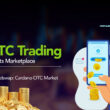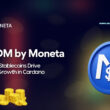Managing a well-diversified portfolio of investments across different ecosystems can be time consuming and risky. A team of developers proposes to create a cross-chain index that represents the value of the Cardano ecosystem, in a very precise way, and that is available in other blockchains, so that users can obtain it directly from their usual native wallets.
To achieve the goal, these developers intend to create a multi-chain decentralized protocol, whose smart contracts will run on Cardano with a one-click token that will link to host chains such as Ethereum and Polygon.
MAYZ will be a decentralized financial protocol, which aims to simplify the challenges of managing a well-diversified portfolio in a rapidly evolving ecosystem, and provide Cardano with exposure to a wide range of different investors.
The Proposal
This proposal was submitted to Catalyst’s Fund10, included in the ‘Catalyst Open’ category.
The team presented a proposal in the Fund9 that was not financed. I wrote an article about the proposal, which I leave at the end(1).
Today there is no standardized assessment or selection criteria for Cardano assets, making it difficult for investors to make well-informed, data-driven decisions.
The proposed solution is based on a scientific approach, to devise tools and methodologies to establish robust indices, rankings and ratings for the assets of the Cardano ecosystem.
The project consists of creating tools in a systemic framework for the evaluation of Cardano assets based on various factors, such as the fundamentals of the project, the experience of the team, technological innovation, community engagement and market liquidity.
By establishing transparent and robust evaluation methods, the idea is to guide investors towards high-quality Cardano assets, while minimizing the risk of scams, low-value projects or inefficient investment choices.
This involves leveraging data analytics, machine learning, and expert input to develop quantitative and qualitative asset evaluation metrics.
The methodology will be developed in the Cardano community, with industry experts and investors throughout the development process, with open discussions, seeking feedback to ensure that the tools and methods fit the needs and priorities of the ecosystem.
Open source methods and tools will be published, with documentation, tutorials and guidelines to ensure accessibility and understanding of their functionality.
The Success Metrics
Here are some of the key measures:
- Adoption and usage: the number of users using the tools, the frequency of use, and user feedback on the effectiveness and value provided.
- Increased diversification: the extent to which the project encourages the diversification of investments within the Cardano ecosystem, analyzing the distribution of investments among the different Cardano assets before and after the implementation of the project.
- Quality of Selected Projects: performance and success of projects that have undergone the evaluation process, taking into account factors such as market capitalization, user adoption, technological advances, and community involvement.
- Community participation and collaboration: participation of community members in discussions, contributions to the development of the evaluation framework, and participation in workshops or webinars.
While some metrics can be measured quantitatively, such as adoption rates and investment distribution, we will also collect qualitative information through user surveys, interviews, and community discussions.
To achieve the objectives, the team proposes:
- Prepare detailed documentation, which will include a comprehensive report, describing the evaluation methodologies, tools and criteria developed during the project.
- Create an open source repository to host the codebase, algorithms, and software tools developed as part of our project.
- Develop workshops, Twitter spaces, and Discord meetups that will provide an opportunity to showcase project results, demonstrate the functionality of assessment tools, and engage in dialogue with participants to gather feedback and viewpoints.
- Seek research collaboration with academic institutions, blockchain research organizations, and industry experts.
The Milestones And The Budget
Milestone 1: Development of Evaluation Framework and Metrics
- Research and analysis: ₳ 4,000
- Documentation and framework design: ₳ 3,000
- Total Cost: ₳ 7,000
Milestone 2: Implementation of Evaluation Tools
- Tools development: ₳ 20,000
- Usability testing and iterations: ₳ 5,000
- Integration with Cardano ecosystem: ₳ 8,000
- Total Cost: ₳ 33,000
Milestone 3: Community Engagement and Collaboration
- Workshops and webinars: ₳ 2,000
- Community collaboration platforms: ₳ 2,000
- Documentation of feedback and suggestions: ₳ 2,000
- Total Cost: ₳ 6,000
Milestone 4: Pilot Testing and Iterative Refinement
- Pilot testing phase: ₳ 5,000
- Refinement based on user feedback: ₳ 5,000
- Total Cost: ₳ 10,000
Milestone 5: Dissemination of Outputs and Knowledge Sharing
- Documentation preparation: ₳ 3,000
- Workshops, webinars, and community events: ₳ 3,000
- Publication and open-source platform: ₳ 3,000
- Total Cost: ₳ 9,000
Additional Budget Elements:
- Project management: ₳ 8,000
- Reports and documentation: ₳ 2,000
- Total Cost: ₳ 10,000
Total Project Cost: ₳ 75,000
The Team
The team says it has partnerships with NMRK, TxPipe, Encoins, Osmium DAO, Tosi Drops, GoKey, Token Allies and others.
Diego Torres —Economics and Data Analysis
Diego says has a strong background in blockchain and extensive project management experience. He has been actively involved in the Cardano ecosystem as a member of the Mayz core team and Cardano ambassador. His experience in business development and team leadership will ensure successful project execution.
He says he has been working in Data Science for more than 10 years and is a Professor at the Universidad de Ciencias Económicas de La Plata.
Diego Macchi —Business Administration.
Diego says he has been actively involved in the Bitcoin and Cardano communities since 2019 and has contributed to projects such as AnetaBTC and Yamfore.
Diego tells us that he has a solid background in Business Administration.
Federico Ledesma Calatayud —Technical Development
Federico says he has extensive experience in the cryptocurrency industry since 2013. He has been a stake pool operator (SPO) of 1MATE and a Cardano Ambassador.
Augustin Franchella —Project Manager
Agustin says he has been involved in the Cardano community for several years and is a co-founder of RatsDAO.
You can see the whole team here.
The Interview
I did a short interview with Diego Torres, on the topics that I think can give the project more clarity.
LiberLion: What is MAYZ’s business model for the platform to be sustainable over time?
Diego: MAYZ Protocol is a decentralized, permissionless, and non-custodial protocol that aims to unlock the full potential of the Cardano ecosystem. You can create, manage and invest in Cardano funds. A fee is collected from AUM (Asset under Management) that is broken among the fund manager, delegators & the protocol. So the protocol will get revenue from all AUM from all the funds.
LiberLion: At Fund9 you presented a proposal for a Cardano Cross-Chain Index. In this Fund10 the proposal is focused on Cardano, why did you decide to change your approach?
Diego: The last 12 / 18 months show that bridges & cross-chain infrastructure needs more time to evolve. There have been a lot of hacks to decentralized bridges, so we believe that this kind of infrastructure, essential for a cross-chain solution, is still in very early stages so we prefer to wait and change a bit the roadmap prioritizing features within Cardano.
LiberLion: Each country has its own laws regarding investments, how will you address the legal issue so that the protocol does not violate laws in certain jurisdictions?
Diego: Regulation is pretty unclear for decentralized protocols, so we can not wait for more clarity if we want to move forward timely. We aim to create a protocol that truly represents decentralized protocols values like Bitcoin or Cardano.
LiberLion: Given that the protocol consists of issuing investment advisory reports, how will you take care that there are no claims on the protocol and perhaps on the development team? Do you have legal advice?
Diego: The protocol does not imply investment advisory service, we only provide the infrastructure for third parties to create funds in a permissionless and non-custodial fashion. Like Dexes provide the infrastructure to create liquidity pools.
Website: https://mayz.io
You can read the original proposal in IdeaScale.
. . .








